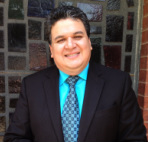|
Hello OCBC family, this week I want to share about a popular hymn for thanksgiving “Now Thanks We All Our God” wrote by the pastor Martin Rinckart.
Martin Rinkart (1586-1649) was the Bishop of Eilenberg, Germany during the Thirty Years' War (1618-1648). Since Eilenberg was a walled city it became a place of refuge for fugitives of the war, and also a place of famine and disease due to overcrowding. In 1637 at the height of their misery, Rinkart was the only clergyman left in the city who could perform the 40 or 50 necessary burial services daily – one of which was for his wife. As if that weren't enough, the city was sacked three times by invaders, one of which imposed a large tribute payment upon the people. During this time, Rinkart managed to find the time to write 7 dramas and 66 hymns. The hymn "Nun danket alle Gott" was originally titled "Tisch-Gebetlein," or a "little prayer before the meal." This humble prayer of thanksgiving is laid out simply and beautifully in the first verse, but it's the next two verses that expand the hymn's focus and have given it its lasting appeal. You can see the Thirty Years' War pressing on his mind in verse two: And keep us in His grace, And guide us when perplexed, And free us from all ills In this world and the next. After a verse of thanks, and a verse that asks for strength during the trials of life, he ends with a paraphrase of the doxology as if to say, "The Lord gives, and the Lord takes away, may the name of the Lord be praised." Please, read these verses and use them as a prayer of thanksgiving. 1. Now thank we all our God with heart and hands and voices, who wondrous things has done, in whom his world rejoices; who from our mothers' arms has blessed us on our way with countless gifts of love, and still is ours today. 2. O may this bounteous God through all our life be near us, with ever joyful hearts and blessed peace to cheer us, to keep us in his grace, and guide us when perplexed, and free us from all ills of this world in the next. 3. All praise and thanks to God the Father now be given, the Son and Spirit blest, who reign in highest heaven the one eternal God, whom heaven and earth adore; for thus it was, is now, and shall be evermore. In His service. Israel. Hello OCBC family.
Today I want to share a not familiar hymn; “Thee Will I Love, My Strength” by Johann Scheffler (1624-1677). This hymn was popular among Moravians, and probably was introduce to John and Charles Wesley by them. At this point of his life, John Wesley was a minister of the Church of England, working for the Lord but not loving the Lord. Years later, in a trip to Georgia with his brother Charles, he met these faithful Christians, the Moravians; he was impressed because he can see a great joy in their faith and they were always singing. When he returned to England he felt the “sacred fire” in 1738, a real conversion for him. He was not a hymn writer like his brother Charles, but he translated many hymns, like this particular one from its original German language. Thee will I love, my strength, my tower; Thee will I love, my hope, my joy. Thee will I love with all my power, With ardor time shall ne'er destroy. Thee will I love, O Light Divine, So long as life is mine. Thee will I love, my life, my Savior, Who art my best and truest friend. Thee will I love and praise forever, For never shall Thy kindness end. Thee will I love with all my heart-- Thou my Redeemer art! I thank Thee, Jesus, Sun from heaven, Whose radiance hath brought light to me; I thank Thee, who hast richly given All that could make me glad and free; I thank Thee that my soul is healed By what Thy lips revealed. Thee will I love, my crown of gladness, Thee will I love, my God and Lord, Amid the darkest depths of sadness, And not for hope of high reward, For Thine own sake, O Light divine, So long as life is mine. In His service. Israel. |
AuthorIsrael Arguello, Archives
July 2024
Categories |

 RSS Feed
RSS Feed